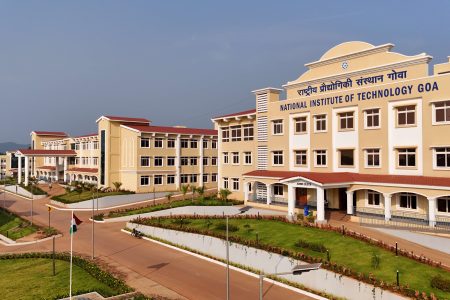Cuncolim: In a significant development for the education landscape in Goa, Prime Minister Narendra Modi is set to inaugurate the permanent campus of the National Institute of Technology (NIT) Goa on Tuesday, 6th February. The inauguration ceremony is expected to be conducted virtually and will witness the presence of several dignitaries, including Shri Sreedharan Pillai, Honourable Governor of Goa; Dr. Pramod Sawant, Chief Minister of Goa; Shri Dharmendra Pradhan, Union Minister of Education & Skill Development; Shri Shripad Naik, Union Minister of State for Ports, Shipping & Waterways & Tourism; Shri Francisco Sardinha, MP, South Goa; and Shri Yuri Alemao, Leader of Opposition and MLA from Cuncolim.
The realization of the NIT Goa permanent campus was envisioned by the late Dr. Manohar Parrikar, the former Chief Minister of Goa, with the aim of establishing an institute of national importance in the state. The project aims to position Goa as a prominent destination for education.
NIT Goa commenced its operations in 2010 at a transit campus located within the premises of Goa Engineering College, Farmagudi, Ponda, Goa. With support from the Ministry of Education, the institute gradually took shape at Cuncolim, South Goa, in 2023. The Government of Goa allocated 113 acres of land in Cuncolim for the permanent campus, transferring it in July 2017. The foundation stone for the campus was laid by Dr. Manohar Parrikar in the presence of Shri Prakash Javadekar, the then Union Minister of Human Resource Development, on December 15, 2018.
The construction of the NIT Goa campus began in May 2019, managed by the Central Public Works Department (CPWD) as the Project Monitoring Committee. The campus, constructed using RCC Precast 3S Technology, spans a total built-up area of 70,750 sqm and accommodates 1,260 students. The construction cost amounted to Rs 390.83 crore.
Noteworthy features of the campus include a tutorial complex, departmental complex, seminar complex, administrative complex, hostels, health center, staff quarters, amenity center, and a sports ground, among other utilities.
The campus places a strong emphasis on environmental sustainability, incorporating a solar plant, sewage treatment plant, water-saving fittings, efficient electric lighting, and solar-powered street lights. Solar panels and local plants in horticulture work have been integrated to align with the weather conditions in the state. Furthermore, the campus buildings have been designed to provide optimal natural ventilation and lighting, minimizing the reliance on electricity. The inauguration marks a significant milestone in Goa’s pursuit of academic excellence and sustainable development.

